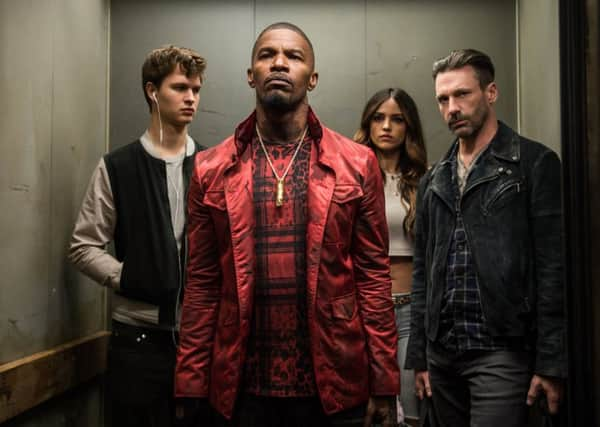Film reviews: Baby Driver | Okja | Wilson


Baby Driver (15) *****
Okja (15) ****
Wilson (15) **
Edgar Wright’s bank robbery movie Baby Driver is a blast of pure pop energy. Having walked away from Ant-Man when it became clear Marvel didn’t want him to put his imprint on the superhero genre, the Shaun of the Dead/Hot Fuzz director has focused his energies instead on creating a subversive summer action movie that remixes all the tropes of the heist film – car chases, shoot-outs, diners, good-looking criminals doing one last job – into a euphoric, musical-inflected spin on the genre.
The “musical” reference isn’t an exaggeration either. Characters might not break into song, but they move and groove to whatever beat is playing in the ears of its iPod-carrying protagonist. Wright cuts the action accordingly: editing gunfights to kick drums, car chases to guitar solos and altering the mood of the movie through brilliant use of its eclectic tracklist, which runs the gamut from the primal stop-start riffage of the Jon Spencer Blues Explosion’s Bellbottoms and soul classics from the likes of Sam & Dave and The Commodores to Queen’s Sheer Heart Attack album and the Simon and Garfunkel song from which the film takes its title. That title also pulls triple duty as a reference to the protagonist’s actual name (“spelled B-A-B-Y”), his youthful features (he’s played by baby faced Mark Ruffalo doppelganger Ansel Elgort) and his occupation (he’s a getaway driver). It also lets Wright pay tribute to Walter Hill’s The Driver, a key influence here that Wright makes more explicit later on by giving Hill a cameo. When we first meet Baby, though, he’s outside a bank, sitting in a playfully conspicuous red car, wearing Risky Business shades and cuing up the perfect song to soundtrack the tyre-screeching manoeuvres he’ll soon have to deploy to escape the cops. The ensuing set-piece is brilliantly orchestrated. As Baby weaves in an out of traffic, out-driving the police at every step, Wright synchs it all up perfectly with the aforementioned Jon Spencer track. He also avoids equating cinematic kineticism with visual confusion by letting us see every detail of the chase, something that amplifies its effectiveness, the way good fight choreography enhances martial arts movies and good dance choreography enhances musicals.
Advertisement
Hide AdThe music here is also integral to the story: it’s Baby’s way of drowning out the tinnitus (“the hum in the drum”) he’s suffered since a childhood tragedy made him an orphan. His late mother was also a singer and his myriad playlists function as a sort of aural womb, providing him with psychological protection from the dangers he faces on a daily basis.
Those dangers come thick and fast in Baby Driver. Baby works for a charismatic Atlanta crime-boss called Doc (Kevin Spacey) who is forcing him to pay off an old debt one job at a time. Baby is the only constant in Doc’s constantly changing crews (Jon Hamm, Jon Bernthal and Jamie Foxx are among the alternating line-up of reprobates). But he’s not cut out for the work and the movie’s status as a self-aware love song to the genre means we already know the fabled final job is never going to completely square him, no matter how many Monsters Inc quotes he feeds Doc about the genuineness of their friendship. Things aren’t helped by the fact that Doc’s crews frequently attract at least one psycho mistrustful of Baby’s taciturn nature and proclivity for earbuds. And when he falls for a waitress named Deborah (played by Lily James), his determination to be with her makes Baby even more vulnerable.
True, the characters aren’t much more than archetypes, but Wright embraces all the clichés, transforming them into a heady cinematic fantasy, one that’s fully in tune with the way pop music can transform reality as it takes shape around you. In this, Baby Driver is the perfect summer movie.
Okja makes a much better case for Netflix’s controversial entry into the realm of big budget filmmaking than the recent Brad Pitt-produced War Machine. The latest creature feature from Korean auteur Bong Joon-ho (The Host, Snow Piercer), it’s a great action-adventure film and a stinging satire of the food industry – all wrapped up in what seems at first like a charming family movie about a young teenage girl’s friendship with her giant pet super-pig.
The eponymous pig in question – which looks a cross between a hippo and a sow and which has been gorgeously rendered in CGI – is actually a genetically modified beast designed to solve the food crisis. Its PR-conscious corporate owners (led by Tilda Swinton’s grinning, Blair-like CEO) have concocted a campaign to make this whole enterprise more palatable to the public by lying about its GM origins and engaging farmers across the world to raise these super piglets to maturity. What they haven’t counted on is the determination of 13-year-old South Korean farm girl Mija (Ahn Seo Hyun) to rescue Okja when the day comes to return her to the US and send her to the slaughterhouse. What fallows is a gleefully anarchic piece of mainstream filmmaking. Like a politically radicalised Spielberg, Bong tugs at the heartstrings while punching you in the gut.
Ghost World aside, Daniel Clowes’ graphic novels don’t seem particularly well suited for cinema, largely because their protagonists feel too misanthropic. The title character of Wilson is no exception. Played by Woody Harrelson, he’s a raging-at-the-world maniac whose late-in-life discovery that he’s the father of a teenage girl sends him on an insufferable journey of self-discovery. It’s episodic, not very funny and the redemptive ending feels far too forced.